
DogFoodAdvisor is reader supported See how
All reviews are 100% impartial but if you buy using links on this page, we may earn a referral fee.
Finding the best food for a dog with a sensitive stomach can be tricky. That’s because even though some digestive problems can be controlled with a simple change in diet, others can be caused by something far more serious which would require professional help for a proper diagnosis.
What can cause dogs to have a sensitive stomach?
One of the main causes of a sensitive stomach in dogs is caused by sudden diet changes. Switching foods too quickly can upset a dog’s digestive system, so it’s important to make the transition slowly.
There are several medical issues which can cause sensitivities too. Conditions such as inflammatory bowel disease (IBD) or colitis, intestinal parasites, pancreatitis – often caused by fatty foods, as well as bacterial or viral infections, such as parvovirus.
Some breeds are more prone to food intolerances too, including German Shepherds and Great Danes. This is due to genetic predispositions or structural issues in their gastrointestinal system.
Just like us, stressful situations or changes in the environment can lead to upset stomachs in dogs and older dogs may develop sensitivities due to decreased enzyme production or changes in their metabolism.
Signs your dog may have a sensitive stomach
Frequent or occasional vomiting after meals can indicate food intolerance or sensitivity as can chronic diarrhea, constipation or mucus in their stools.
Excessive or particularly smelly gas can be a sign of poor digestion, as well as food coming back up shortly after eating.
If your dog starts to refuse meals or becomes picky about food, this could indicate discomfort with the diet. And some dogs may eat grass to soothe their upset stomach.
Physical signs to look out for include bloating – a visibly distended abdomen or discomfort when touched – and audible gurgling or burping.
If your dog shows persistent signs of a sensitive stomach, consult a veterinarian to identify the underlying cause and develop a suitable dietary or medical plan.
What ingredients cause sensitivities in dogs and why?
Certain dog food ingredients are common triggers for sensitivities or intolerances in dogs. Here’s a list of potential culprits and the reasons why they can cause issues.
Proteins such as beef, chicken, dairy (milk, cheese and yogurt), and eggs are common allergens, as repeated exposure over time can lead to adverse reactions.
Grains including wheat, corn, and soy are popular fillers in dog food and can be difficult to digest. Some dogs can also be gluten intolerant.
Artificial additives and preservatives (e.g., BHA, BHT, Ethoxyquin) can irritate a dog’s digestive system as well as artificial colors and flavors which have no nutritional value.
Fatty or rich ingredients can lead to pancreatitis in sensitive dogs. While grain alternatives, such as legumes (peas, lentils, chickpeas) in large quantities, can lead to sensitivities or gas.
Unspecified meat meals or animal byproducts often found in lower-quality foods can trigger issues. And thickeners, such as carrageenan and guar gum found in wet food can irritate the stomach lining.
Sugar, corn syrup, or artificial sweeteners are unnecessary and can contribute to obesity.
Spices such as garlic and onion powder can be toxic to dogs in even small amounts, as they damage red blood cells and irritate the stomach.
What is the best dog food for dogs with a sensitive stomach?
Once a medical condition has been ruled out by a vet, look for high quality foods which do not contain fillers, artificial preservatives, or by products
A limited ingredient diet may be the best way forward to minimize ingredients that could cause sensitivities. Also foods with added probiotics to support gut health are recommended.
You might also wish to consider specialized formulas designed specifically to aid digestion.
On this page… we’ll share with you the Dog Food Advisor’s best foods for a dog with a sensitive stomach… and we’ll answer the 7 most frequently asked questions about feeding dogs with food-related digestive issues.
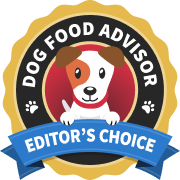
Best Dog Food for Sensitive Stomachs December 2025
Here are The Dog Food Advisor's best dog food brands for sensitive stomachs for December 2025.
-
Best Raw Dog Food for Dogs with a Sensitive Stomach

We Feed Raw Turkey Patties
We Feed Raw Turkey Patties is an excellent choice for dogs with a sensitive stomach as turkey is a lean protein that’s easy for them to digest. It’s also low in fat so can help reduce gastrointestinal issues.
This particular recipe is one of six frozen raw foods included in our review of the We Feed Raw product line. Raw food can be easier on a sensitive stomach because it’s free from fillers and unnecessary additives commonly found in some processed dog foods.
Dry matter label analysis reveals the recipe contains 49% protein, 25% fat and 0% estimated carbs… producing a fat-to-protein ratio of about 52%.
High quality ingredients. Highly recommended.
For more choices: See our Best Raw Dog Food page
Read our review of the full We Feed Raw Dog Food (Raw Frozen) range here
Things we like
- Lean protein source
- Low in fat
- No additives
Main Ingredients Turkey tails, turkey gizzards, turkey wings, turkey liver, WFR vitamin + mineral mix Type Grain-free, raw Protein Percentage 49% AAFCO Standards All Life Stages Best For Puppies and adults Sample buyer review...
Read more buyer reviews at WeFeedRaw.com"I have been feeding my dogs We Feed Raw for three years now and they love their food, their coats are always shining. They are active, happy, healthy dogs."
-
Best Wet Food for Dogs with a Sensitive Stomach
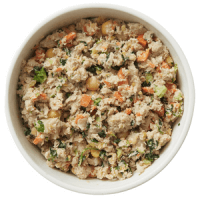
The Farmer's Dog Pork
Fresh Pork is one of four fresh recipes evaluated in our review of The Farmer’s Dog product line.
This recipe acquires the majority of its animal protein from fresh pork. Dry matter label analysis confirms it contains 36% protein, 28% fat and 28% estimated carbs… resulting in a fat-to-protein ratio of about 78%.
A human-grade recipe custom designed and packaged to fit the nutritional needs of all breeds. As close to a homemade dog food as you can get. Not cheap. Highly recommended.
For more choices: See our Best Fresh Dog Food page.
Read our review of the full The Farmer’s Dog range here
Things we like
- Human-grade
- Free from preservatives
- Customized meals
Main Ingredients USDA Pork, sweet potato, potato, green beans, cauliflower Type Grain-free, fresh Protein Percentage 36% AAFCO Standards All Life Stages Best For Puppies and adults (including large breed puppies) Sample buyer review...
Read more buyer reviews at TheFarmersDog.com"We have noticed clearer eyes, shinier coat, and much more energy!"
-
Best Dog Food for German Shepherds with a Sensitive Stomach
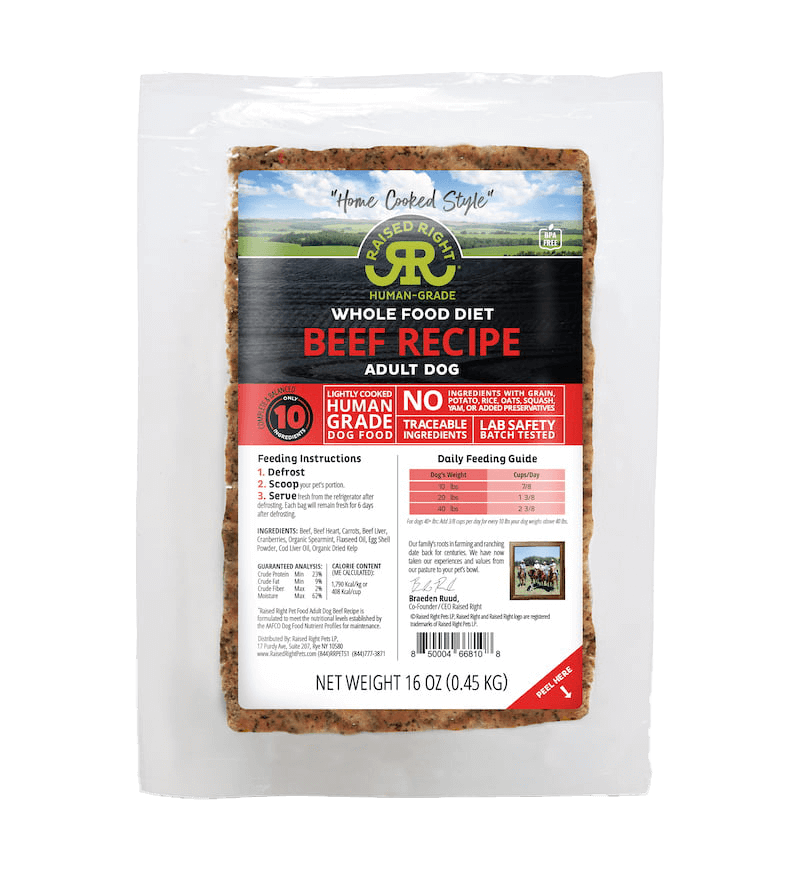
Raised Right Dog Food
Raised Right Beef is s an excellent option for German Shepherds with sensitive stomachs. This brand focuses on providing gently cooked, human-grade meals tailored for dogs with specific dietary needs.
This recipe is one of 11 included in our review of the Raised Right product line. It contains a simple list of ingredients, typically including beef, beef liver, and vegetables like carrots and squash.
Dry matter label analysis reveals the recipe contains 61% protein, 24% fat and 8% estimated carbs… delivering a fat-to-protein ratio of about 39%.
One of the best fresh, human-grade dog foods on the market. Highly recommended.
Read our review of the full Raised Right Dog Food (Fresh) range here
Things we like
- Gently cooked
- Low carbohydrates
- Easily digestible
Main Ingredients Beef, beef heart, carrots, beef liver, cranberries Type Grain-Free (carrots, cranberries) Protein Percentage 61% AAFCO Standards Maintenance Best For Adult dogs only Sample buyer review...
Read more buyer reviews at rasiedright.com"All of our experiences with Raised Right have been top notch."
-
Best High Protein Food for Dogs with a Sensitive Stomach
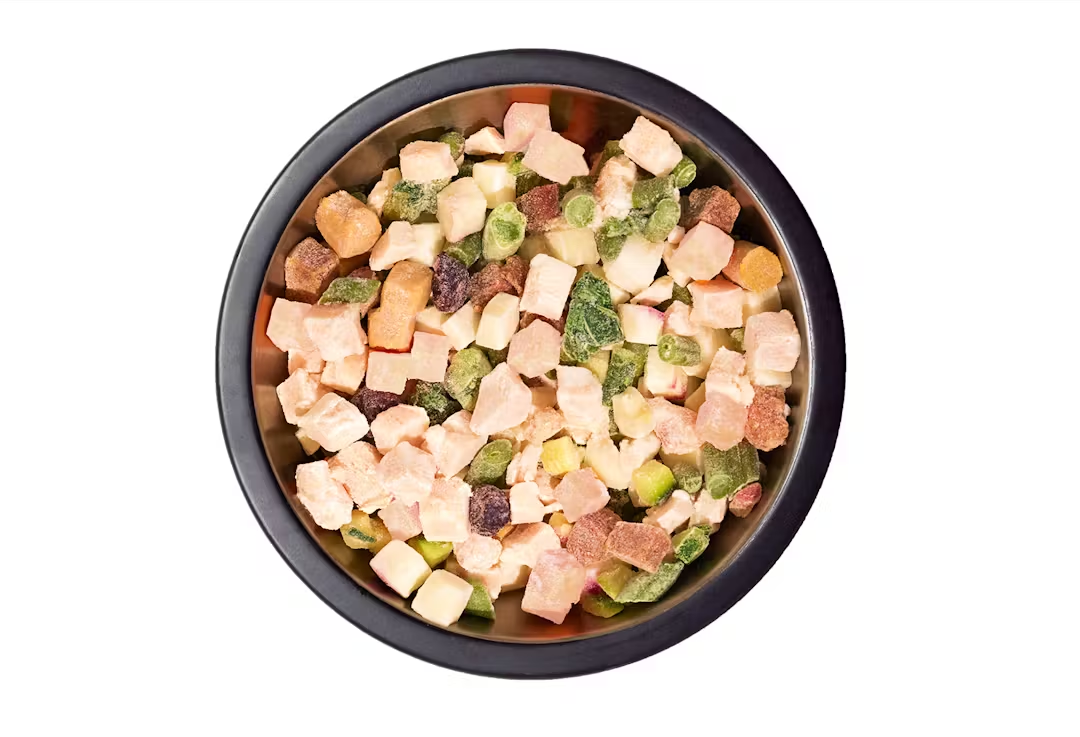
Maev Raw Chicken Weight & Digestion
Maev Raw Chicken Weight & Digestion provides high protein and fat levels to support your dog’s daily activities. With only 10 ingredients and a single protein source, this recipe is an excellent option for dogs with dietary restrictions or sensitive stomachs. It is also free from common non-protein allergens, such as wheat, corn, and dairy.
It is one of nine recipes in our review of the product range and received the Dog Food Advisor’s highest rating: 5 stars.
This recipe derives the bulk of its protein from USDA chicken. Dry matter label analysis reveals it contains 44.1% protein, 14.6% fat and 33.3% carbohydrates . . . resulting in a fat-to-protein ratio of about 33%.
Read our review of the full Maev Raw Dog Food (Raw) range here
Things we like
- High in protein
- Limited ingredients
- Human-grade
Main Ingredients USDA chicken, USDA chicken liver, USDA chicken gizzard, green bean, zucchini Type Grain-Free Protein Percentage 44.1% AAFCO Standards All Life Stages Best For All dogs and puppies Sample buyer review...
Read more buyer reviews at maev.com"Obsessed with Maev. My pup, Nori, has been eating the calm mix from Maev. She's obsessed with it and has been having better digestion with it."
-
Best Dry Food for Dogs with a Sensitive Stomach
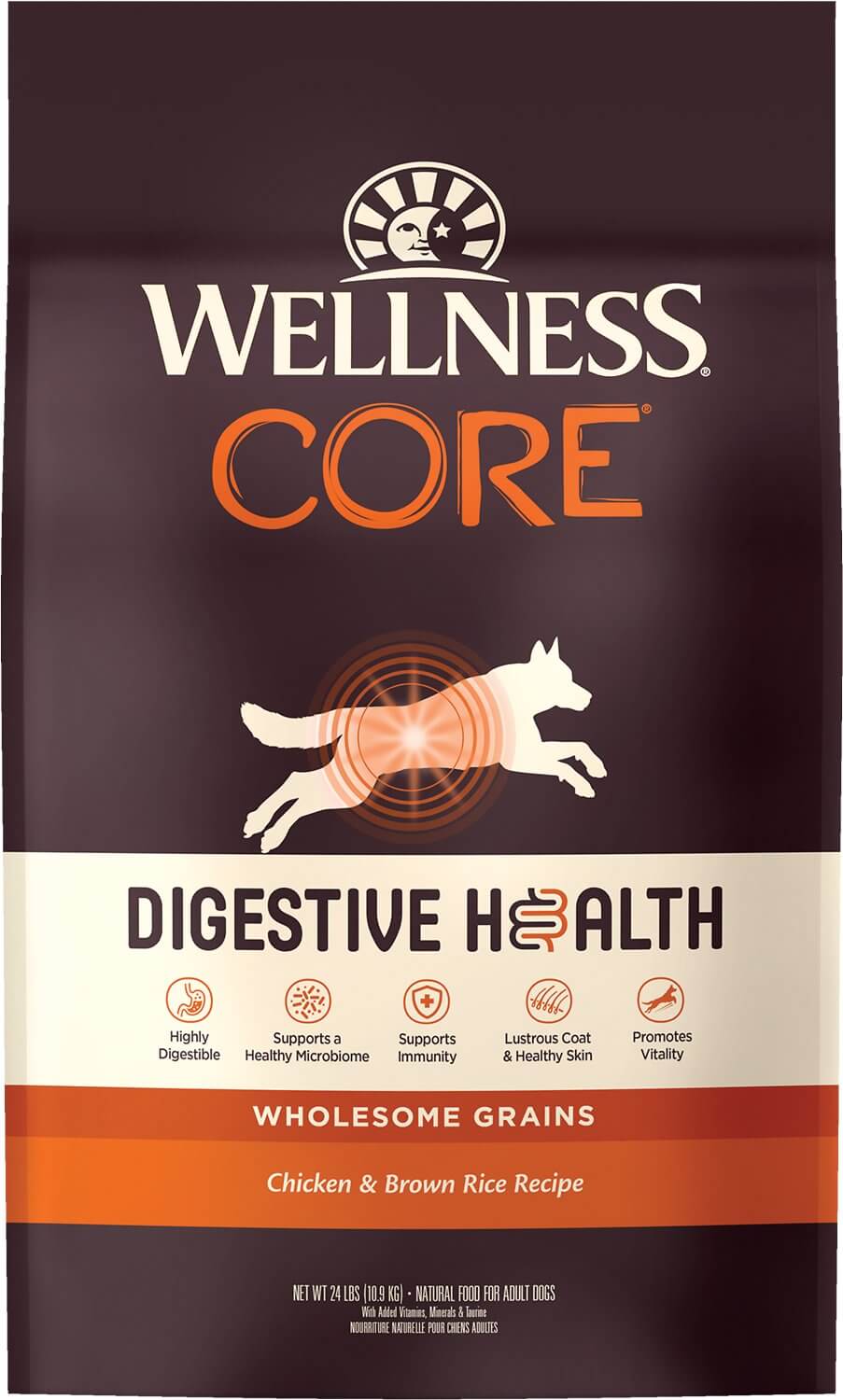
Wellness Core Digestive Health Wholesome Grains Chicken & Brown Rice
Digestive Health Wholesome Grains Chicken and Brown Rice is a highly digestible, probiotic-coated kibble, enhanced with digestive enzymes and prebiotic fibers to support optimal gut health.
It is one of six dry recipes evaluated in our review of the Wellness Core product line.
This particular recipe derives the bulk of its animal protein from fresh chicken, turkey meal, and chicken meal. Dry matter label analysis reveals the recipe contains 33% protein, 13% fat and 45% estimated carbs… with a fat-to-protein ratio of about 40%.
Read our review of the full Wellness CORE Digestive Health Dog Food (Dry) range here
Things we like
- Includes pro and prebiotic fibers
- High in protein
- Omega fatty acids and antioxidants
Main Ingredients Deboned chicken, turkey meal , chicken meal , brown rice, barley, oat groats Texture Dry Type Grain-inclusive Protein Percentage 33% AAFCO Standards Maintenance Best For Adult dogs only Sample buyer review...
Read more buyer reviews at Chewy.com"My dog has some digestive issues and this was recommended to us by our veterinarian. Ever since making the change we've had zero issues. I cannot say enough good things about this food. We even moved our senior furbaby to their formula and she's been acting so much younger ever since."
-
Best Prescription Food for Dogs with a Sensitive Stomach
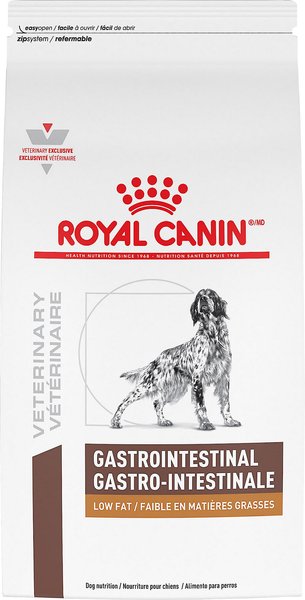
Royal Canin Veterinary Diet Gastrointestinal
UnratedRoyal Canin Gastrointestinal is a prescription diet often recommended by veterinarians for dogs with chronic or acute gastrointestinal issues.
It is one of six dry digestive recipes included in our review of the Royal Canin product line and features easily digestible proteins, carbohydrates, and fats that reduce the workload on the digestive system and help prevent upset stomachs.
Royal Canin Gastrointestinal gets the bulk of its meat protein from chicken meal. Our dry matter label analysis reveals the recipe contains 22% protein, 9% fat and 60% estimated carbs… resulting in a fat-to-protein ratio of about 43%.
This dog food is not rated due to its intentional therapeutic design.
Read our review of the full Royal Canin Veterinary Diets Gastrointestinal Dog Food (Dry) range here
Things we like
- Low fat
- Prebiotics for gut health
- Soluble fibers
Main Ingredients Brewers rice, chicken by-product meal, wheat, barley, natural flavors Texture Dry Type Grain-inclusive Protein Percentage 22% AAFCO Standards Maintenance Best For Adult dogs only Sample buyer review...
Read more buyer reviews at Chewy.com"This is a quality dog food. My dog had very bad digestive issues. Since we switched her to Royal Canin Gastrointestinal she has been doing very well. Plus, she loves it."
-
Best Dog Food for Puppies with a Sensitive Stomach
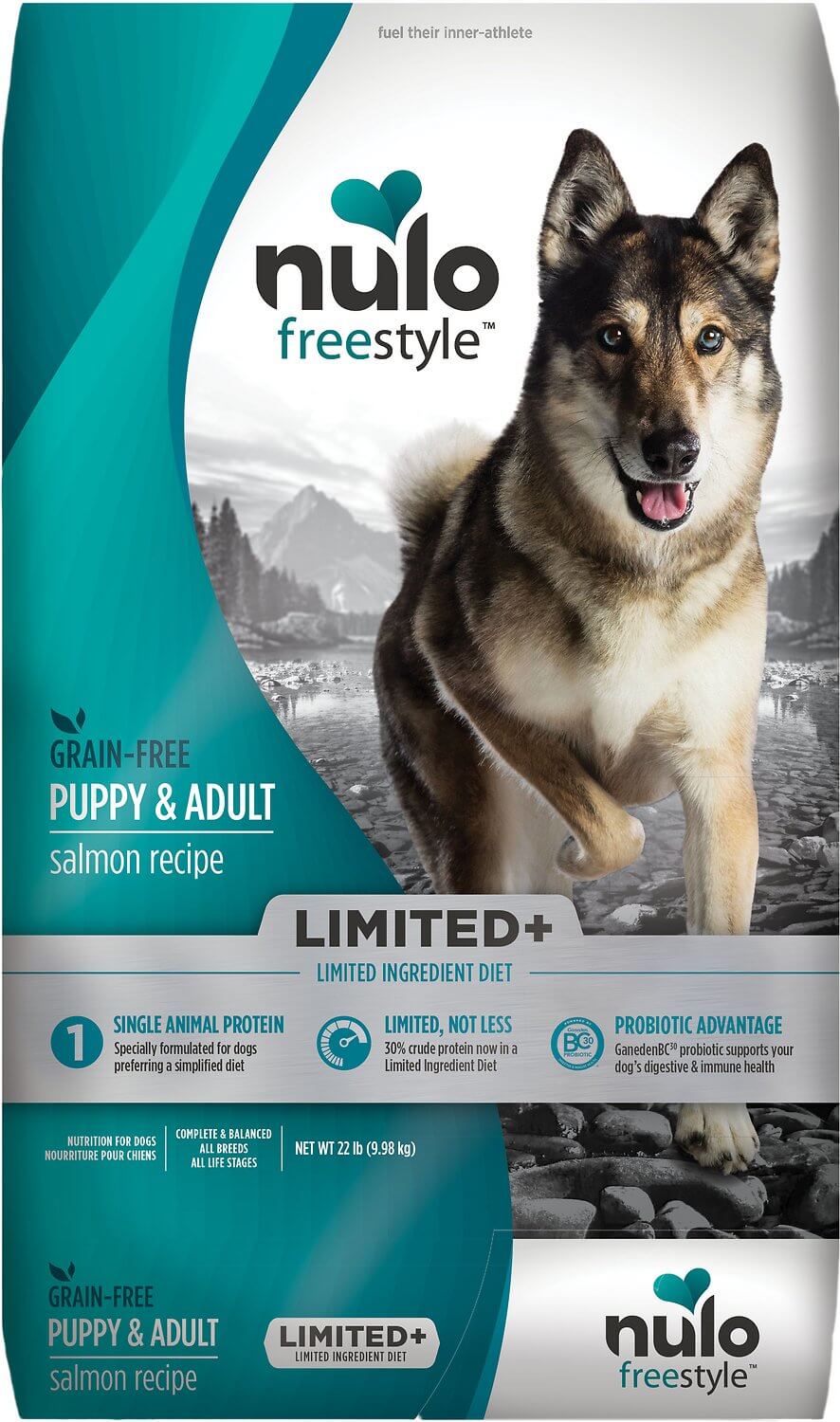
Nulo Freestyle Limited+ Puppy & Adult Salmon Recipe
Nulo Freestyle Limited+ Puppy & Adult Salmon Recipe includes Nulo’s proprietary GanedenBC30 probiotic to promote gut health, improve digestion, and boost immunity.
It is one of four limited ingredient recipes rated in our review of this dry product line.
The formula takes the greatest share of its meat protein from fresh salmon and salmon meal. Our dry matter label analysis reveals the recipe contains 33% protein, 20% fat and 39% estimated carbs… which creates a fat-to-protein ratio of about 60%.
Boasts a single source of animal protein… which helps eliminate a number of potential allergens, like chicken, eggs or peas.
Read our review of the full Nulo Freestyle Limited Plus Dog Food (Dry) range here
Things we like
- Single protein source
- Limited ingredients
- Fortified with probiotics
Main Ingredients Deboned salmon, salmon meal, chickpeas, chickpea flour, canola oil Type Grain-free Protein Percentage 33% AAFCO Standards All Life Stages Best For Puppies and adults (including large breed puppies) Sample buyer review...
Read more buyer reviews at Chewy.com"My dogs have been eating Nulo for about 2 years now and they love it! One on my dog was always super picky but also has allergies. My other one had a sensitive stomach. Both have had no issues since switching to Nulo. It’s a bit pricey but I think it’s worth it."
-
Best Dog Food for Great Danes with a Sensitive Stomach
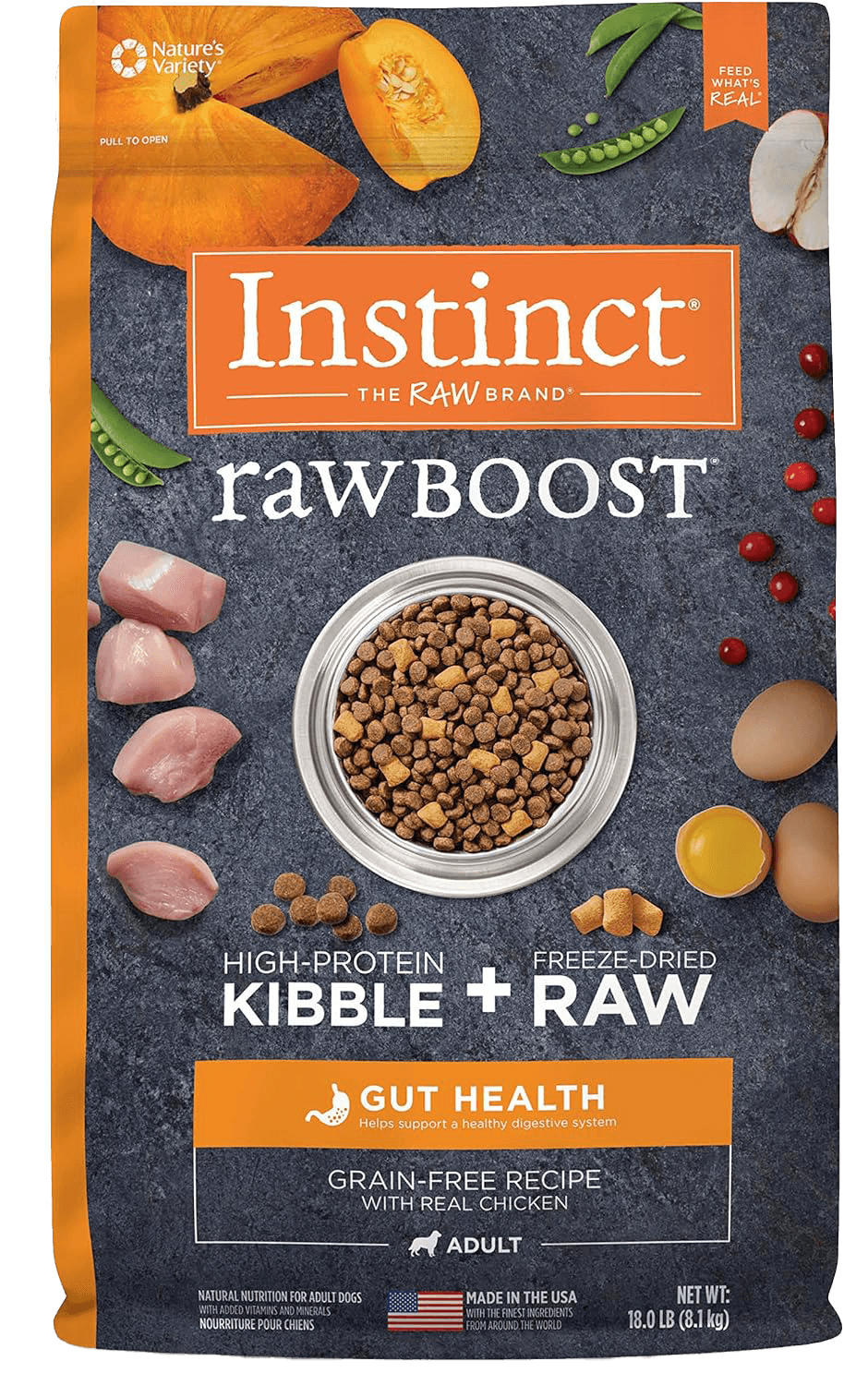
Instinct Raw Boost Gut Health
Instinct Raw Boost Gut Health combines high-protein kibble with freeze-dried raw pieces, offering nutrient-rich, minimally processed ingredients that suit Great Danes’ large sensitive digestive systems.
It is one of 12 dry recipes evaluated in our review of the Instinct Raw Boost product line and acquires the major part of its meat protein from fresh chicken and chicken meal. Our dry matter label analysis reveals the recipe contains 34% protein, 19% fat and 39% estimated carbs… which creates a fat-to-protein ratio of about 55%.
Enriched with prebiotic fibers and omega fatty acids to enhance nutrient absorption, support a healthy coat, and ease skin irritation caused by food sensitivities, this highly digestible, minimally processed formula is highly recommended by our in-house nutritionist, Laura Ward.
For more choices: See our Best Dog Food for Great Danes page.
Read our review of the full Instinct Raw Boost Dog Food (Dry) range here
Things we like
- Include freeze-dried raw pieces
- Natural probiotics
- Free from common allergens
Main Ingredients Chicken, chicken meal, peas, tapioca, canola oil Texture Dry Type Grain-free Protein Percentage 34% AAFCO Standards Maintenance Best For Adult dogs only Sample buyer review...
Read more buyer reviews at Chewy.com"My dog loves it! We were trying to find the best type of meal for him, and rawboost was a life changer!"
More Top Picks
To view more top dog foods by category… click the link below that best meets your personal feeding needs.
Frequently Asked Questions
How can I tell if my dog has a sensitive stomach?
Some of the most common signs your dog may be suffering from a sensitive stomach include one or more of the following:
- Loss of appetite
- Vomiting
- Diarrhea
- Gas or bloating
- Decrease in activity
- Gurgling noises
- Signs of abdominal pain
In the following video, Dr. Al Townshend, staff veterinarian at Wellpet, discusses the signs of food allergy or ingredient intolerance in dogs… and how the right diet can help control a sensitive stomach.
What type of dog food is best for a sensitive stomach?
There are 3 types of food that may help a dog with a food-related digestive problem:
- Limited ingredient dog food
- Hypoallergenic dog food
- Prescription GI dog food
What is a limited ingredient dog food?
Limited ingredient diets are dog foods that contain fewer components… which can help you pin down the specific ingredient to which your pet may be sensitive.
The best limited ingredient dog foods typically contain:
- Single novel protein
- Limited number of ingredients
- Most protein sourced from meat
- Low to moderate fat
- Probiotics (to aid digestion)
What should I avoid in a limited ingredient dog food?
Avoid feeding any limited ingredient recipe that contains any of the following low quality items:
- Excessive fillers (soybean hulls, wheat mill run, corn bran, etc.)
- Artificial flavors
- Coloring agents
- Controversial preservatives
- Chemical additives
What is hypoallergenic dog food?
Hypoallergenic dog foods are made by using proteins that have been chemically “split” into their basic amino acid building blocks.
That way, the offending ingredient becomes virtually “invisible” to your dog’s immune system… so your dog is less likely to have an allergic reaction to the food.
What are prescription GI dog foods?
Prescription GI (gastrointestinal) dog foods are special purpose diets made for dogs suffering from digestive problems. These recipes typically include similar limited ingredient or hypoallergenic designs.
However, in addition, they also include ingredients specifically designed to support healthy digestion.
How do I safely transition to a new food if my dog has a sensitive stomach?
If your dog has a sensitive stomach, be patient. Don’t rush the transitioning process. Take your time to minimize the chance of GI upset.
Start with about 20-25% of the “new” food and 75-80% of the “old” food. Then, slowly increase that amount to a full 100% over the next 7 to 10 day period.
Final word
The Dog Food Advisor does not accept money, gifts, samples or other incentives in exchange for special consideration in preparing our reviews.
However, we do receive a referral fee from online retailers (like Chewy or Amazon) and from sellers of perishable pet food when readers click over to their websites from ours. This helps cover the cost of operation of our free blog. Thanks for your support.
For more information, please visit our Disclaimer and Disclosure page.








